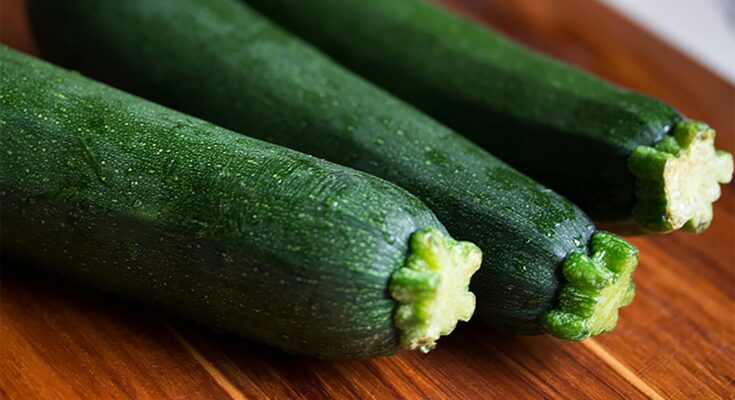Zucchini is a versatile and nutritious vegetable that’s gaining popularity for its myriad health benefits. Whether you’re aiming to shed a few pounds, boost your heart health, or improve your digestion, zucchini has something to offer. In this article, we’ll explore the impressive zucchini health benefits, including its rich nutritional profile, and provide creative ways to incorporate this powerhouse veggie into your diet. Discover why zucchini deserves a regular spot on your plate and how it can contribute to your overall well-being.
Nutritional Profile of Zucchini
Zucchini is not only delicious but also packed with essential nutrients that contribute to a healthy diet.
Macronutrients
A 100-gram serving of zucchini contains about 17 calories, making it an excellent low-calorie food. It is composed mostly of water (about 95%), which contributes to its refreshing quality and hydrating properties. Zucchini also provides a small amount of protein and carbohydrates, with negligible fat.
Vitamins and Minerals
Zucchini is a powerhouse of vitamins and minerals. It’s rich in:
- Vitamin C: Essential for immune function and skin health.
- Vitamin B6: Important for brain health and energy metabolism.
- Vitamin A: Vital for vision and immune support.
- Potassium: Helps regulate blood pressure.
- Magnesium: Supports muscle and nerve function.
Antioxidants
Zucchini contains antioxidants such as lutein, zeaxanthin, and beta-carotene, which play a crucial role in protecting the body from oxidative stress and inflammation.
Health Benefits of Zucchini
Supports Weight Loss
Trying to shed a few pounds? Zucchini might be your new best friend. Its low calorie and high water content make it a filling addition to meals without adding extra calories. Plus, its fiber content helps keep you satiated for longer periods, reducing the temptation to snack between meals.
Promotes Healthy Digestion
Zucchini is an excellent source of dietary fiber, which is crucial for a healthy digestive system. Fiber adds bulk to stools and promotes regular bowel movements, helping to prevent constipation. The high water content also aids in keeping the digestive tract hydrated, facilitating smoother digestion.
Boosts Heart Health
Heart health is another area where zucchini shines. Its high potassium and magnesium content helps regulate blood pressure, while the fiber content aids in reducing cholesterol levels. Consuming zucchini regularly can contribute to maintaining a healthy cardiovascular system.
Enhances Eye Health
Zucchini is rich in nutrients that promote eye health, such as vitamin C, beta-carotene, lutein, and zeaxanthin. These antioxidants help protect the eyes from damage caused by free radicals and may reduce the risk of age-related macular degeneration and cataracts.
Strengthens Immune System
Thanks to its high vitamin C content, zucchini can help boost your immune system. Vitamin C stimulates the production of white blood cells, which are essential for fighting off infections. The antioxidants in zucchini also play a role in reducing inflammation and supporting overall immune function.
Aids in Blood Sugar Control
For those managing blood sugar levels, zucchini is an excellent choice. It has a low glycemic index, meaning it won’t cause a rapid spike in blood sugar levels. Additionally, the fiber content helps slow down the digestion and absorption of sugar, making it easier to manage blood sugar levels.
Improves Bone Health
Zucchini provides several nutrients that are important for bone health, including vitamin K, magnesium, and calcium. These nutrients work together to strengthen bones and may help prevent osteoporosis and other bone-related issues.
Incorporating Zucchini into Your Diet
Adding zucchini to your diet is easy and delicious. Here are some simple and creative ways to enjoy this nutritious vegetable.
Simple Recipes
Zucchini Noodles
Also known as zoodles, zucchini noodles are a fantastic low-carb alternative to traditional pasta. Simply spiralize the zucchini and sauté it lightly with olive oil and garlic. Top with your favorite sauce and enjoy!
Grilled Zucchini
Grilling zucchini brings out its natural sweetness. Slice the zucchini lengthwise, brush with olive oil, sprinkle with salt and pepper, and grill until tender. This makes for a great side dish or salad addition.
Creative Uses
Zucchini Bread
Zucchini bread is a moist, delicious treat that can be enjoyed as a snack or breakfast. Grate the zucchini and mix it into your favorite bread batter along with spices like cinnamon and nutmeg.
Stuffed Zucchini
For a hearty meal, try stuffed zucchini. Hollow out the zucchini and fill it with a mixture of cooked quinoa, vegetables, and cheese. Bake until the zucchini is tender and the filling is golden brown.
Cooking Tips
To retain the maximum nutrients, it’s best to cook zucchini lightly. Steaming, sautéing, and grilling are excellent methods. Avoid boiling as it can cause the loss of water-soluble vitamins. Pair zucchini with healthy fats like olive oil to enhance the absorption of fat-soluble vitamins.
Conclusion
Zucchini is more than just a versatile ingredient in your kitchen; it’s a nutrient-packed powerhouse with numerous health benefits. From supporting weight loss and promoting healthy digestion to boosting heart and eye health, zucchini offers something for everyone. So next time you’re at the grocery store, be sure to pick up some zucchini and start reaping the benefits of this amazing vegetable.
FAQs
Is zucchini better cooked or raw? Zucchini can be enjoyed both ways. Raw zucchini retains more of its water-soluble vitamins, but cooking it can enhance the absorption of certain antioxidants.
Can zucchini help with weight loss? Absolutely! Zucchini is low in calories and high in water and fiber, making it a filling, low-calorie food that can aid in weight loss.
How does zucchini compare to other vegetables? Zucchini stands out for its versatility and nutrient density. It’s lower in calories than many starchy vegetables and offers a good mix of vitamins, minerals, and antioxidants.
Are there any side effects of eating too much zucchini? While zucchini is generally safe to eat, consuming large amounts may cause digestive discomfort in some people due to its fiber content.
What are some easy ways to prepare zucchini? Simple methods include grilling, sautéing, and steaming. Zucchini noodles, grilled slices, and stuffed zucchini are popular and delicious options.

